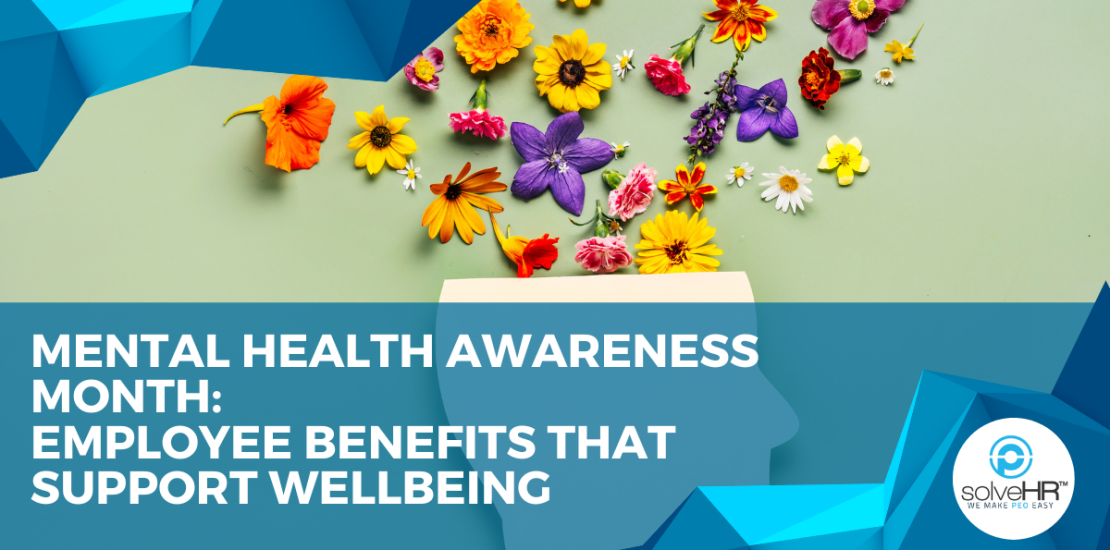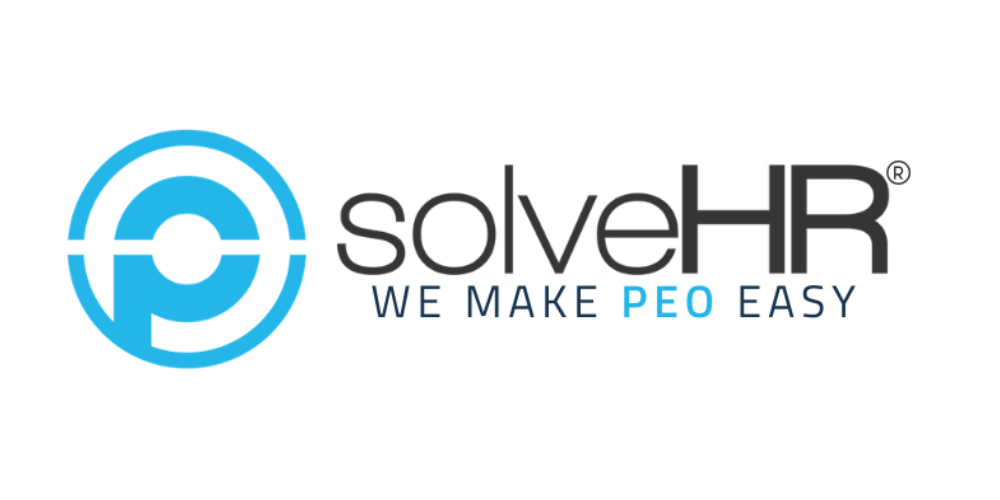Mental Health Awareness Month: Employee Benefits That Support Wellbeing
- 05/07/2025
- Posted by: Matt Muriel
- Category: Uncategorized

May is Mental Health Awareness Month, a crucial time to bring attention to mental health in the workplace. As employee well-being increasingly becomes a priority, companies are realizing that supporting mental health isn’t just beneficial for employees—it’s also vital for productivity and engagement. By offering employee benefits that support mental health, businesses can foster a more supportive and resilient work culture. At SolveHR, we’re here to help you understand the benefits that make a difference in your team’s mental health and well-being.
The Importance of Mental Health in the Workplace
Mental health is a critical aspect of overall well-being. Studies show that employees who feel supported in their mental health are more engaged, have lower absenteeism, and are better able to manage stress. Additionally, businesses that prioritize mental health see a positive impact on retention and morale, making mental health benefits a valuable investment.
Key Benefits That Support Employee Mental Health
- Access to Mental Health Resources and Counseling
- What It Is: Providing access to mental health professionals, either through Employee Assistance Programs (EAPs) or health insurance coverage, is one of the most direct ways to support employees.
- Why It Helps: EAPs offer confidential access to counseling and support services for employees dealing with personal or work-related issues. For many, knowing they have a resource to talk to can make a big difference.
- SolveHR Tip: Make sure your EAP or health insurance covers a range of mental health services, including therapy, crisis counseling, and support for substance use issues.
- Flexible Work Schedules
- What It Is: Offering flexibility in work hours or remote work options allows employees to balance personal and professional responsibilities more effectively.
- Why It Helps: Flexible schedules can reduce stress, allowing employees to handle appointments, family obligations, or even just mental health days as needed. The flexibility often enhances job satisfaction and reduces burnout.
- SolveHR Tip: Consider implementing flexible policies for all roles where feasible and communicate these options clearly to your team.
- Paid Mental Health Days
- What It Is: Mental health days are paid time off that employees can use specifically for mental health needs, helping them recharge and manage stress.
- Why It Helps: Encouraging employees to take time off for their mental well-being shows your commitment to their health and reduces the stigma around mental health discussions.
- SolveHR Tip: Implement policies that allow employees to take mental health days as part of their PTO, and ensure managers understand the importance of supporting this need.
- Wellness Programs and Mindfulness Resources
- What It Is: Wellness programs can include activities like yoga, meditation classes, and workshops on stress management, which help employees develop strategies to manage their mental health.
- Why It Helps: These programs provide proactive support for mental health, equipping employees with techniques to handle stress before it escalates.
- SolveHR Tip: Offer virtual or in-person wellness sessions and provide access to mindfulness apps such as Headspace or Calm through group discounts or subsidies.
- Financial Wellness Programs
- What It Is: Financial stress is a common mental health trigger, so offering resources like budgeting workshops or access to financial advisors can help alleviate this stress.
- Why It Helps: By addressing financial well-being, you help employees manage one of the major stressors impacting mental health. Financial support can improve overall stability and reduce stress levels.
- SolveHR Tip: Consider offering financial literacy programs or access to personal finance tools and advisors, even on a part-time or quarterly basis.
- Workplace Mental Health Training for Managers
- What It Is: Training managers to recognize and respond to signs of mental distress in employees can make a big difference in the overall well-being of a team.
- Why It Helps: When managers understand mental health and know how to address it compassionately, they can create a supportive environment and provide necessary resources to their team members.
- SolveHR Tip: Provide mental health awareness training for managers and educate them on the benefits available to employees so they can guide their teams effectively.
- Creating a Culture of Openness
- What It Is: Beyond specific benefits, a workplace culture that prioritizes mental health allows employees to feel safe discussing their mental health needs.
- Why It Helps: When employees know they won’t face stigma or judgment, they’re more likely to seek help when they need it. Building a supportive culture reduces absenteeism and promotes retention.
- SolveHR Tip: Encourage leadership to model openness about mental health, and promote awareness activities like workshops or company-wide discussions during Mental Health Awareness Month.
How to Effectively Communicate Mental Health Benefits
Offering benefits is only part of the equation—employees need to know what’s available to them. Here are some ways to ensure your team understands and takes advantage of mental health benefits:
- Regularly Remind Employees of Resources
- Use monthly newsletters, emails, or team meetings to remind employees of mental health resources like counseling, EAPs, or wellness activities. This keeps information top-of-mind and shows your commitment to mental well-being.
- Provide Confidential Access to Resources
- Ensure all benefits and mental health resources are confidential and easily accessible. Employees are more likely to use these resources if they’re assured of privacy and ease of access.
- Encourage Conversations Around Mental Health
- Promote Mental Health Awareness Month with open discussions, lunch-and-learn sessions, or virtual seminars. Make it clear that the company supports mental health and that resources are available to everyone.
- Promote Mental Health Awareness Month with open discussions, lunch-and-learn sessions, or virtual seminars. Make it clear that the company supports mental health and that resources are available to everyone.
How SolveHR Supports Mental Health in the Workplace
SolveHR is dedicated to helping businesses support their employees’ mental health through comprehensive benefits and resources. Our team assists with designing wellness programs, setting up EAPs, and educating managers on fostering a mentally healthy work environment. We can help you create an approach that aligns with your business needs and provides meaningful support to your team.
Mental Health Awareness Month is a great opportunity for businesses to evaluate and expand their mental health benefits. Offering resources such as EAPs, flexible schedules, and wellness programs not only improves employee well-being but also enhances morale and productivity. If you’re interested in implementing or improving mental health benefits for your team, contact SolveHR today. Let’s work together to build a mentally healthy workplace.

